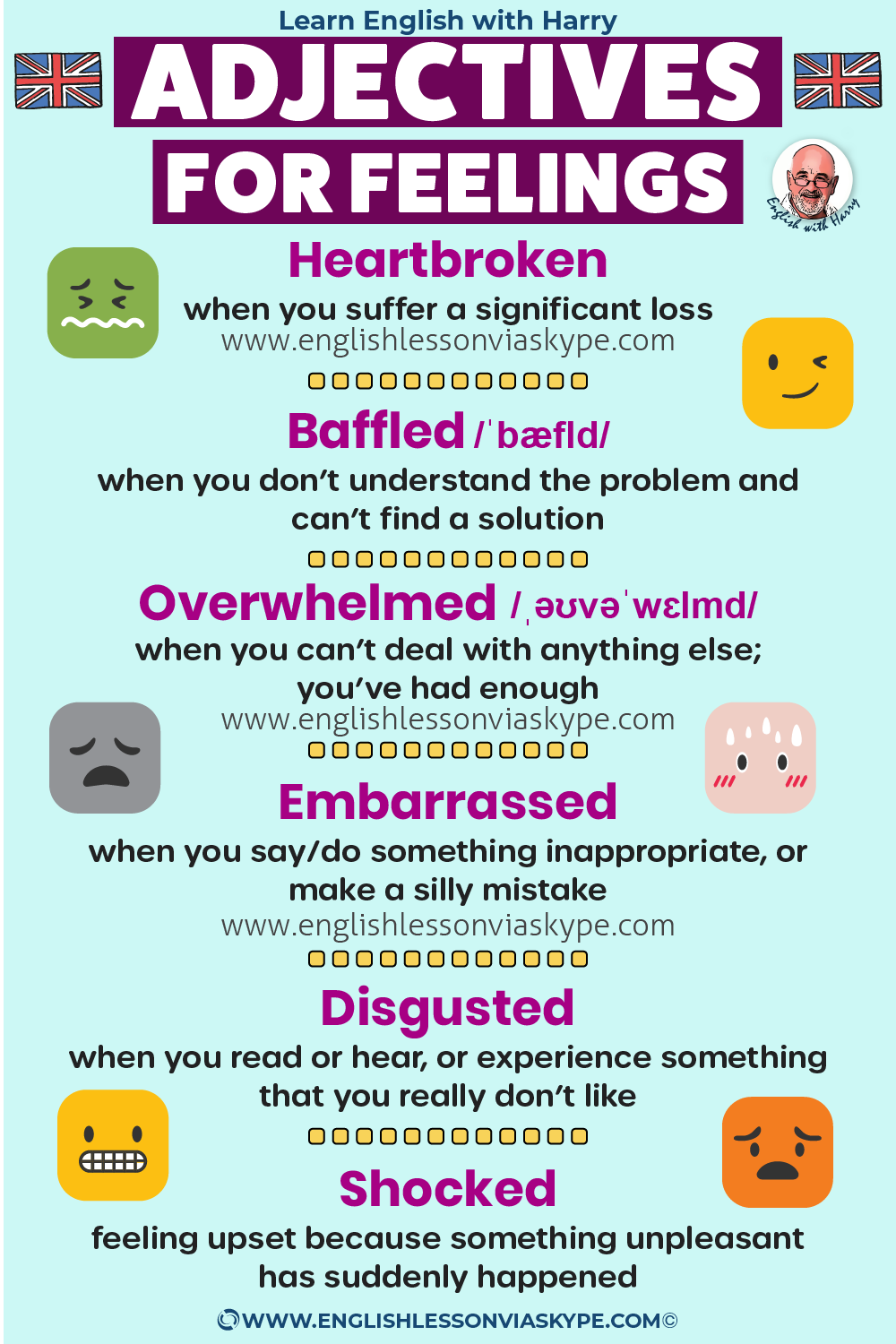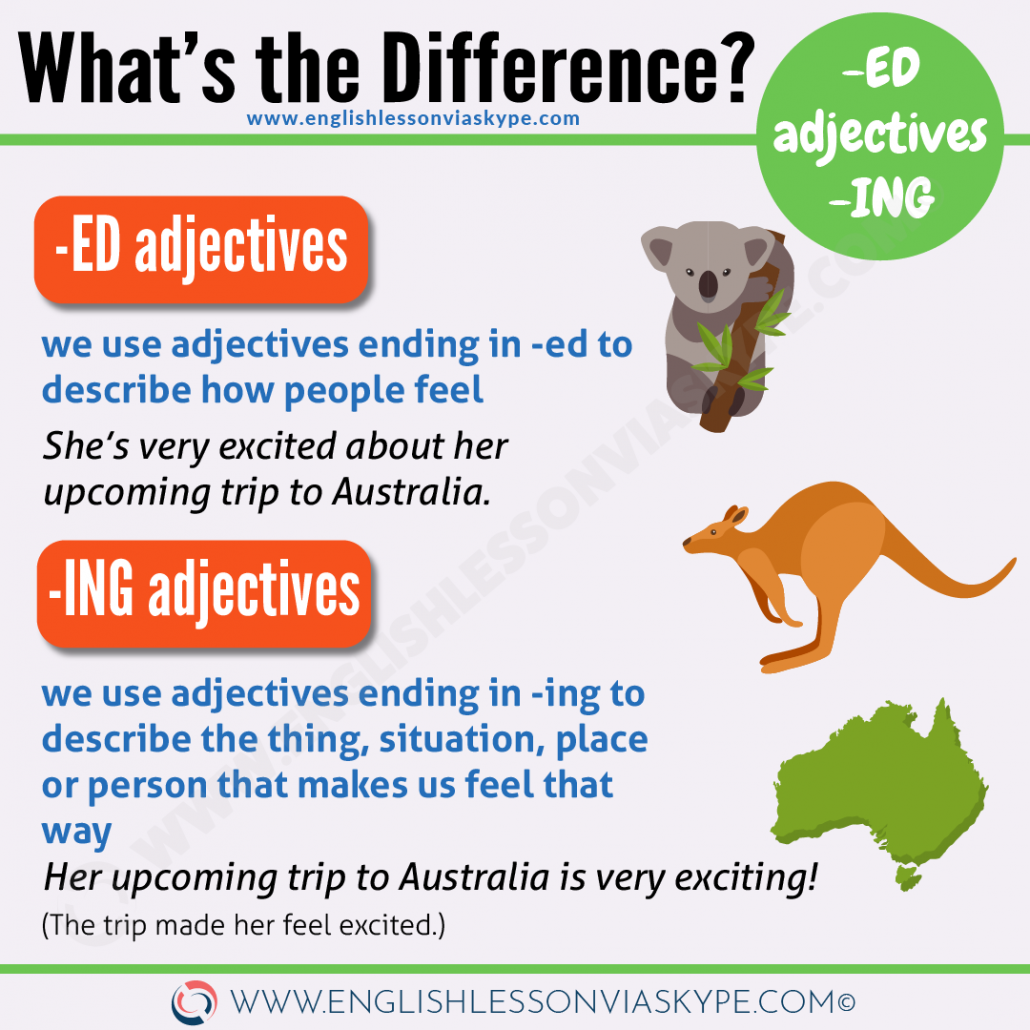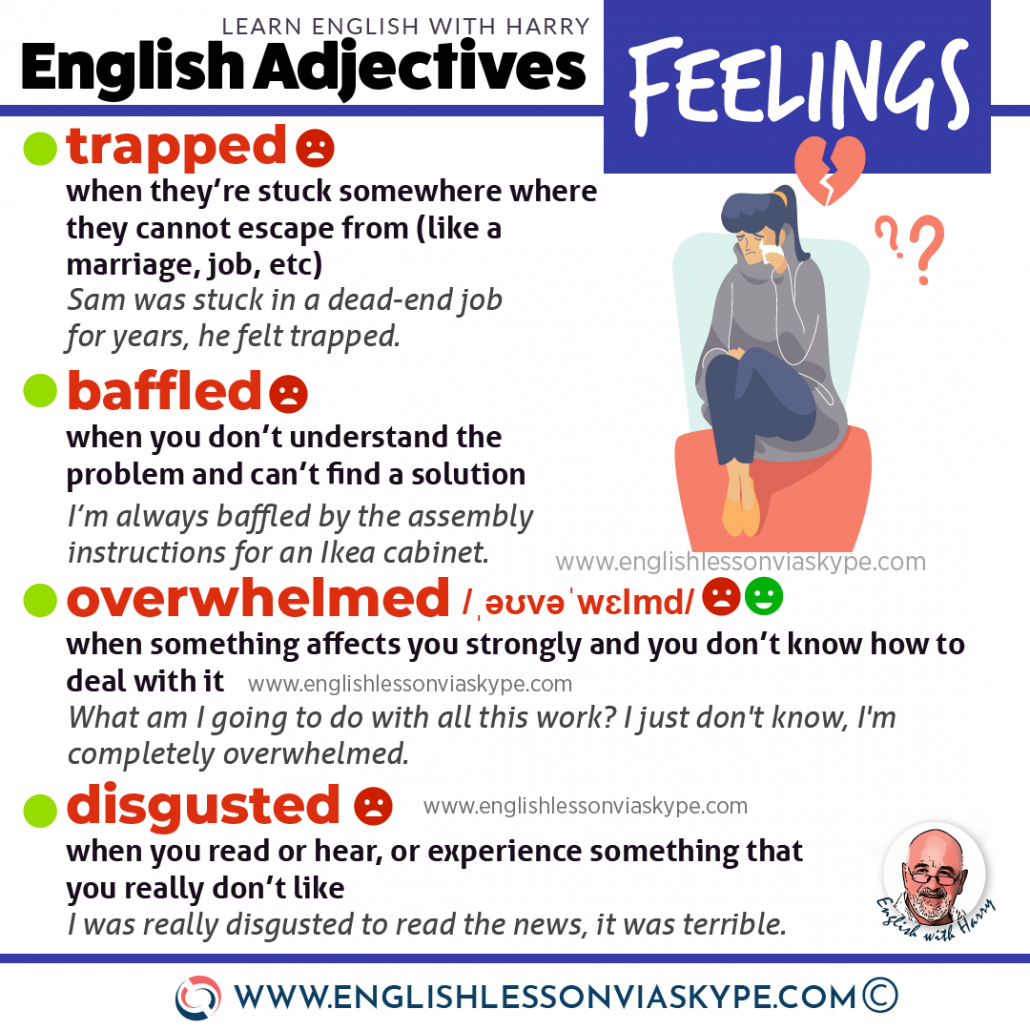Learn to describe your feelings in English. There are many ways in which you can describe how you feel. Today, I’m going to take adjectives and show you examples of how you can use them in English.
We’re also going to revise grammar rules about adjectives ending in -ing and -ed. Stay tuned!
Table of Contents
Harry
How to describe your feelings in English

Hi, there this is Harry and welcome back to my advanced English lessons. What am I going to talk to you about?
Today, we’re going to talk about your feelings and we’re going to use some adjectives to express those feelings. I’m going to give you the adjectives and then I’ll go through them one by one, explain them to you and give you a couple of examples.
Intermediate to Advanced English Marathon

INSANITY: doing the same thing over and over again and expecting different results.
Albert Einstein
- What you'll learn:
- better understanding of more complex grammar structures
- advanced English vocabulary words
- British & American slang
- perfect your listening skills through practing different accents
- This marathon is for you if you're:
- stuck at an intermediate English level
- tired of confusing explanations
- a mature student
- shy & introverted
So let’s take the first adjective
heartbroken
Meaning: a feeling that someone gets when they suffer a significant loss of a loved one
Examples:
George was heartbroken because he didn’t get the place in the university he was hoping for.
The vet had to put our dog down, the whole family was heartbroken.
The next word is
trapped
Meaning: someone feels trapped when they’re stuck somewhere where they cannot escape from (like a marriage, job, etc)
Examples:
Our relationship doesn’t seem to be going anywhere, I feel trapped.
Sam was stuck in a dead-end job for years, he felt trapped. Then he finally plucked up the courage and decided to hand in his notice.
Describe your feelings in English

Share and help other students to improve English language skills.
The third word on my list is
embarrassed
Meaning: someone feels embarrassed when they say/do something inappropriate, or make a silly mistake
Examples:
People often feel embarrassed when they have no one to sit with at lunch or no one to talk to.
Dan forgot Sarah’s birthday. He was really embarrassed, he had written it in his diary but for some reason, he forgot all about it.
The next word is difficult to pronounce, so we’ll practice it
overwhelmed /ˌəʊvəˈwɛlmd/
Meaning: you feel overwhelmed when you can’t deal with anything else, you’ve had enough
Example:
What am I going to do with all this work? I just don’t know, I’m completely overwhelmed.
We can also use it in a positive way.
Example:
I’m completely overwhelmed by people’s generosity, I wasn’t really expecting this.
Describe your feelings in English
Next on my list is
baffled /ˈbæfld/
Meaning: when you don’t understand the problem and can’t find a solution
Examples:
I just can’t work it out, it just has me completely baffled.
I’m not a DIY specialist so Ikea furniture instructions made me baffled.
surprised
Meaning: when something unexpected has happened, usually something positive
Example:
He was surprised by the number of people who called to congratulate him on his retirement.
book your trial English Lesson
If we want to talk about a negative surprise, then we use another adjective
shocked
Meaning: feeling upset because something unpleasant has suddenly happened
Examples:
I felt shocked when I saw the news on the tv.
Poor James is completely shocked, the stock market has fallen by 20%.
And then the final adjective I have is
disgusted
Meaning: someone feels disgusted when they read or hear, or experience something that they really don’t like
Examples:
Young kids usually feel disgusted when they eat green vegetables.
I was really disgusted to read the news, it was terrible.
Adjectives ending in -ing and -ed
Remember when you’re using adjectives that end in -ed and -ing, these adjectives often get confused.
When we’re talking about ourselves and here we’re talking about how we feel and we usually use adjectives ending in -ED.
- I am disgusted
- I am shocked
- I am surprised
- I am embarrassed
So we use the -ed to describe how we feel.
If we want to describe a thing, we always use -ing.
- it is disgusting
- it is shocking
- it is embarrassing
- it is surprising
Now, we can talk about people using -ing, but be really really careful because it does change the meaning.
So, for example, bored and boring.
If I say
I am bored,
it means I’ve got nothing to do. I wish I had a good book to read or a movie to watch.
But if I say
I am boring,
it means nobody wants to be stuck in the corner of a party with me because I’m not so interesting.
So be very careful how you use adjectives ending in -ing when you’re referring to people.
I have put up a short quiz on the difference between adjectives ending in ED and ING and check your understanding.
Adjectives ending in -ed and -ing

Describe your feelings in English
And when you’re talking about your own feelings, of course, there are many many more adjectives ending in -ed that will help you describe your feelings in English, but these are just some that I wanted to help you out with.
So let me give them to you again:
- heartbroken
- trapped
- embarrassed
- overwhelmed
- baffled
- surprised
- shocked
- disgusted
And just remember the -ed and -ing endings on those.
Thanks for listening and thanks for watching and don’t forget to subscribe to my YouTube channel. And as always, join me again soon.

More information
For more information on English grammar rules, English collocations and English idioms, check out the links below:
If you’re thinking of taking the IELTS English proficiency exam, don’t forget to check out the information on the British Council website.
You will love these English lessons

Air Idioms and Phrases in English
Here you will learn air idioms and phrases that you can use in your conversational English. Learn natural English expressions


Fixed English Expressions about Health
Here you will learn English fixed expressions about health and also learn how to describe your symptoms to a doctor


English Vocabulary related to Movies
Learn English vocabulary related to movies and entertainment. We will also focus on different types of movies in English and English adjectives for describing movies.